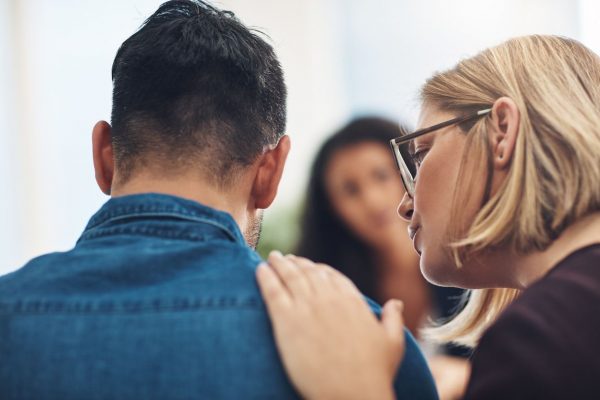Therapist and buddhify user Sarah Levin, MA, LPCC, brings us frontline to a psychiatric stabilization unit, where she uses guided mindfulness training to assist clients.

Written by Sarah Levin, MA, LPCC, a buddhify user since 2013
Working as a therapist on a psychiatric stabilization unit, I see adults struggling with severe mental illness such as schizophrenia, mood disorders, PTSD, and substance use disorders. In the support groups I run, I almost always start us off with a guided meditation.
Mindfulness exercises are valuable and useful for anyone, but most especially for people who are struggling with mental illness or addictions. There’s a significant amount of research backing up its effectiveness. While some clients are skeptical of meditation and insist they “can’t do it,” they almost invariably report that the practice is helpful in managing anxiety, worry, and self-criticism.
The most debilitating problems people experience have their foundations in defects/dysfunction in either emotional regulation or interpersonal communication. If people can learn to identify and name their emotions; recognize that their emotions are fluid and impermanent in nature and not life-threatening; pay attention to how their emotions influence the way they communicate with others; and be able to communicate in ways that are not reactive, defensive, or judgmental in nature, their symptoms will undoubtedly improve.
We frequently play the “Difficult Emotions” meditations, since our clients are stabilizing after a serious psychiatric crisis and often feeling lonely, scared, and anxious. The “Pain & Illness” meditations have been very helpful too, as many clients are concurrently struggling with physical illness or painful physical withdrawal from substances.
In addition to using guided audio meditations, I also use a biofeedback program with my clients that encourages awareness of respiration rate, heart rate, and skin conductance using sensors that are placed on the fingertips and provide real-time feedback to the client on a computer screen through a series of games or meditations. In combination, these mindfulness activities help clients to detach from obsessive or harmful thoughts, and instead maintain some curiosity and a nonjudgmental attitude about those thoughts.
People are often hijacked by their worries and memories, especially in the case of recovery from trauma, and mindfulness is key in grounding them in the present moment. This is especially necessary for survivors of trauma who experience intrusive flashbacks; they need all the tools they can learn to manage those very disorienting moments. Particularly with clients who are underserved or indigent, resources are spread so thin and any interventions that can be practiced independently and without a lot of money are invaluable.
I began using mindfulness meditation training when I was hospitalized and recovering from a life-threatening illness several years ago. I would say meditation was the singular most effective intervention that started me on the road to recovery. When I struggled with anxiety that threatened to overwhelm me, mindfulness exercises increased my resilience and my sense of self-efficacy. Ultimately, I no longer had to rely on external factors (such as medication) and instead was able to develop an internal locus of control to manage my symptoms. My practice was further developed when I was in graduate school and studied the psychology of meditation in depth at Naropa University, a Buddhist-oriented institution in Boulder, Colorado.
As a therapist in a highly emotionally charged/occasionally volatile setting, it has been an absolute necessity to train myself to carefully attend to my instincts, moods, and emotional shifts. My mindfulness training helps me to model behavior for my clients, who are often unaware of or aversive to their experiences (or, as we sometimes say in therapy-land, “experientially avoidant”). My effectiveness as a therapist is greatly improved, having learned these skills.
Sarah Levin is a long-time buddhify user and mental health counselor based in Denver, Colorado.
If you feel you have learnt something important through your meditation practice and you’d like your share your insight or experience we’d love to hear from you. Let Dana know via stories@buddhify.com and she’ll get in touch.